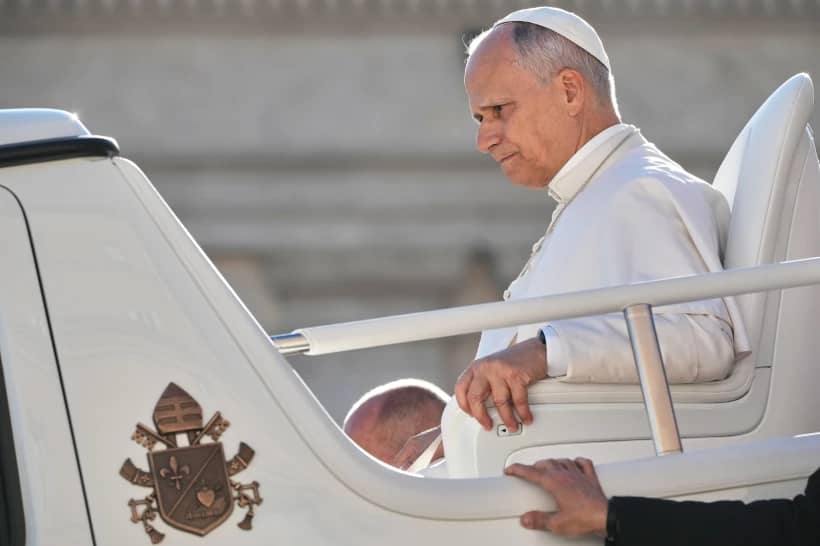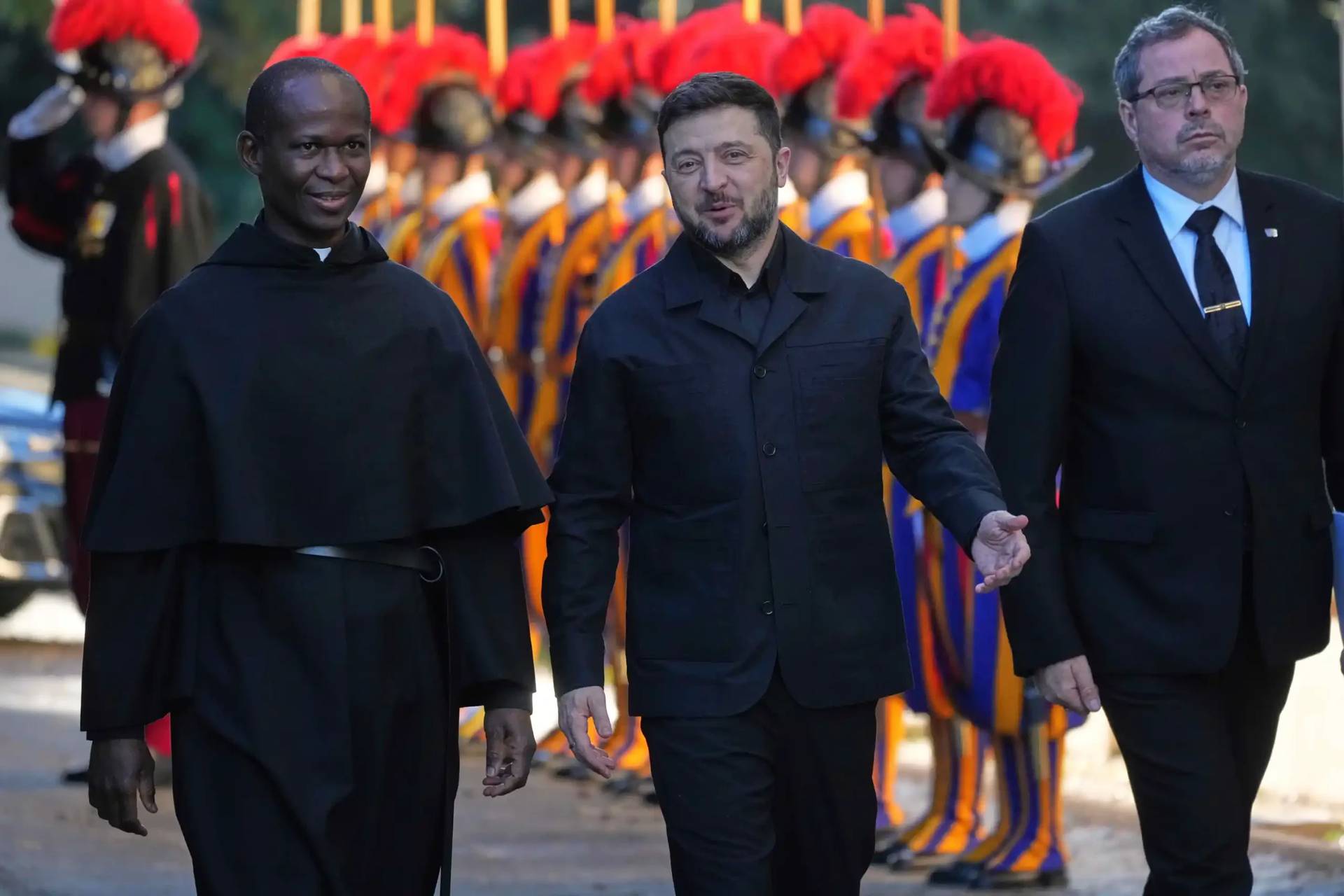ROME— Popes always wear multiple hats – they’re pastors, statesmen, voices of conscience, and ecclesiastical governors, among many other roles. It’s not every day, however, you hear one deliver a graduate lesson in business management.
Yet on Saturday, Pope Francis donned all those hats during his visit to the Italian city of Genoa, one of the Mediterranean’s major ports. Depending on whom the pontiff was addressing, he came off as an economics professor, church manager, and youth pastor, all in the span of about five hours.
The pope as economist
After departing from Rome in the early morning, Francis was at the struggling ILVA plant by 8:30, where 3,500 men and women, many of whom were in their blue onesies and hard hats, standing next to union representatives and business people.
It was here that the pope turned to business ethics, arguing that companies which disrespect and exploit their workers ultimately fall apart because they lack the trust needed to weather a crisis.
Francis called on businesspeople not to become “speculators” focused only on short-term profits, and insisted that the “new capitalism” with its fetish of building a “meritocracy” is often a thinly-disguised form of moral cover for inequality.
He also said that the church is a “friend of work,” among other reasons because Jesus himself was a worker.
Francis began his remarks by thanking those present for their welcome referencing his family, showing once again, as he usually does in these events, a more human side: “Being close to the port reminds me from where my father left,” he said. “This is a great emotion, thank you for your welcome.”
The pope’s father, Mario José Bergoglio, was an Italian immigrant who, together with his mother and wife, fled to Argentina in 1929.
Francis acknowledged that he knew the questions in advance, and that he had prepared some answers because he wanted to “respond well.” He also said, however, that he had a pen, to take down notes and add new thoughts, which he did often.
“I give you a premise: the world of work is a human priority,” he said. “And as such, it’s a Christian priority, our priority, and also a priority of the pope.”
Giving his own definition of a businessman, Francis said it is one who knows his workers, because he works alongside them and with them. “He shares the weariness of workers and the joy of workers.”
A good businessman, he said, finds firing someone to be painful, and will avoid doing so if possible. A person who thinks about resolving the problems of his company by firing employees, isn’t a good businessman but a “wheeler and dealer.”
The progressive transformation of businessmen into speculators, he said, is an illness of the economy, Francis said, defining a speculator as one who “doesn’t love his company or his workers, but they’re solely a means for making profit.”
When an economy is run by speculators, it’s “ruined” the pope said, because it loses its face, becomes abstract. Since people aren’t behind the decisions of speculators, the economy becomes a ruthless one.
Francis also regretted that at times, politics seems to reward speculation and not those who invest and believe in work: “Laws passed for the dishonest end up penalizing the honest.”
Answering to the question of a working woman, the pontiff reiterated some concepts he’s spoken about before, from the fact that high levels of youth unemployment is a “threat to our future,” to a criticism of social welfare, focused on giving a monthly check that allows one to keep the family afloat without solving the problem: “It’s work that gives them dignity.”
“The real objective isn’t income for all but work for all,” he said. “Without work for all, there won’t be dignity for all.”
He also denounced underpaid labor, under-the-table labor and said that dialogue in the world of work “is no less important than dialogue in the parish.
“The world of work is the world of the people of God, we’re all the church and the people of God,” Francis said, noting that many Bible passages speak of people who work, from the disciples, who were fishermen, to Jesus himself.
The pontiff also tied the working force to strong democracies, saying that “taking away work from people or exploiting them with unworthy or poorly paid work is anti-constitutional.”
Francis the ecclesiastical governor
From the factory, Francis was taken to the cathedral of Genoa, currently being restored, where hundreds of nuns, priests, seminarians and bishops awaited him. Here, too, he kept looking down to see the notes he had prepared, but more often than not he spoke off-the-cuff, adding anecdotes and joking with those who posed him questions.
For instance, when Sr. Rosalba, whom he said he’d known for years, asked him a question, Francis joked, saying that she’s a great person, who has one defect: “She likes driving 90 miles an hour.”
He began by praying for the 28 Egyptian Coptic Christians murdered on Friday by Islamic terrorists. They were killed, Francis said, because “they did not want to deny the faith.”
After leading the group in a silent prayer, he once again denounced the high number of Christian martyrs: “Let us not forget that Christian martyrs today are more than in the early times of the Church.”
The last question posed to him was about the lack of vocations. Francis said that though there are several reasons, demographics can’t be ignored: “If there are no children, there will be no vocations. When families had bigger families, there were more [vocations].”
Yet, the pope said, it’s “easier to live with a cat or a dog.”
Francis also said that it’s a “transversal problem,” with vocations down not only to the priesthood and religious life, but also from the laity, who no longer marry.
“It’s a transversal crisis, and as such it’s a time to ask the Lord and ourselves, what do we have to do? What do we have to change? Addressing the problems is a necessary thing. Learning from problems is mandatory,” he said.
Francis also included the “spiritual worldliness” of many priests and religious, saying that young people ask for a witness of “authenticity, apostolic zeal, harmony with the charism.”
After having given several examples of that “spiritual worldliness,” from nuns watching soap operas and the “hunting of vocations” some religious orders did in the 1990s, particularly in Eastern Europe and the poor parts of Latin America, to the lack of joy displayed by those with religious vocations and a lack of outreach, Francis said, “We have to accept that with these behaviors, we are responsible for a certain [vocational] crisis.”
Francis also called for priests, consecrated men and women and religious sisters to be available to listen to youth, even if they are “boring, always saying the same,” because if the religious don’t have time for the youth, they’ll find someone else to talk to.
“Vocations are there, God gives them,” he said, before warning against the “counter-witness,” meaning being bad religious.
A missionary pastoral conversion, the pope said, is needed, before advising those present to read the passages of his apostolic exhortation, Evangelii Gaudium, on the Joy of the Gospel, in which he wrote about this.
Asked about the best way for priests to have an “intense spiritual life” in their ministry, Francis told them to look at Jesus, who “spent most of his time on the road, in the midst of the crowd,” to then retire at night to pray.
Jesus, the pope said, was never still but not in a rush either, he didn’t have a never-ending to-do-list, instead spending time with people and making time for prayer.
Francis also reminded those present that bishops and priests “aren’t the Lord,” but disciples, who need to help and listen to each other. When there are diocesan meetings – or any other meeting – priests shouldn’t “be in orbit” distracted when others talk, but paying attention. These priests, who think they don’t need to listen to what others say, are “Wikipedia priests,” who think they know it all.
After “thinking it over three times,” the pope also lamented that one opinion is asked about a priest to consider him to become a bishop. Sometimes those asked chose to answer with defaming information, “out of jealousy.”
Following his own advice of devoting time to encountering people, Francis devoted close to two hours to the group, mindless of the fact that he would run late to his following meeting: the youth.
Francis, the people’s pope, talks to youth
Talking to youth, both those gathered in a shrine dedicated to the Virgin Mary and those watching through video link from a local prison, Francis once again answered questions, and, once again, more often than not diverted from his prepared remarks.
Donning his pastoral hat, he began by leading the youth in prayer.
The group Francis met with is currently working in a missionary plan, encouraged by Cardinal Angelo Banagsco, archbishop of Genoa, who launched a youth missionary program as a response to Francis’s Evangelii Gaudium.
“Missionary experience opens our eyes and our heart,” Francis said. “And so we stop being tourists of life, turning us into men and women, youth who love with commitment. Tourists of life … you saw them, those who take pictures and see nothing. They don’t know how to look.”
The pontiff also told the youth that to be hypocrites is to be “suicidal,” not looking into the hearts of people but just pictures. Don’t be tourists, he insisted, “be lovers of life.”
Talking about their missionary efforts, Francis told them that the beginning of each mission is to “love,” because without it, the trip would be no more than tourism. “Loving is having the capacity to hold the dirty hand, to look in the eye those who are in degrading situations, to see Jesus in them.”
If, instead, one goes to mission thinking “these stupid people, who don’t know about religion, I’ll teach them,” it’s better to “stay home and pray the rosary.”
He also called the youth to be “stubborn in hope,” because in each of those who’ve gone through difficult situations, there’s the image of Jesus, who for one reason or the other was mistreated. In each of them, there’s a story of pain and suffering that can’t be ignored.
Visibly moved, Francis then encouraged the youth to look for the truth, to have a healthy spiritual life that makes the youth question some of the things that today’s culture presents as normal.
“Is it normal that every day, indifference grows? ‘I don’t care about what happens to others’ … Is it normal that so many contemporaries, migrants, come from far away, hard countries, bloodied by a selfishness that leads to death, live in our cities in difficult situations? Is it normal that the Mediterranean Sea has turned into a cemetery?” he asked.
If something is not normal, the pope said, get involved. Courage, he insisted, is to question that which is not normal.
He closed his dialogue, which lasted for over an hour, by suggesting to them a morning prayer: “Lord, I ask you to please challenge me today, to come to bother me some, and give me the strength to rise to the challenge.”
Francis was scheduled to have lunch in the shrine with poor people, refugees, homeless and prisoners, before resuming his activities with a visit to a local pediatric hospital, then to close the visit with an open-air Mass in a local square.













